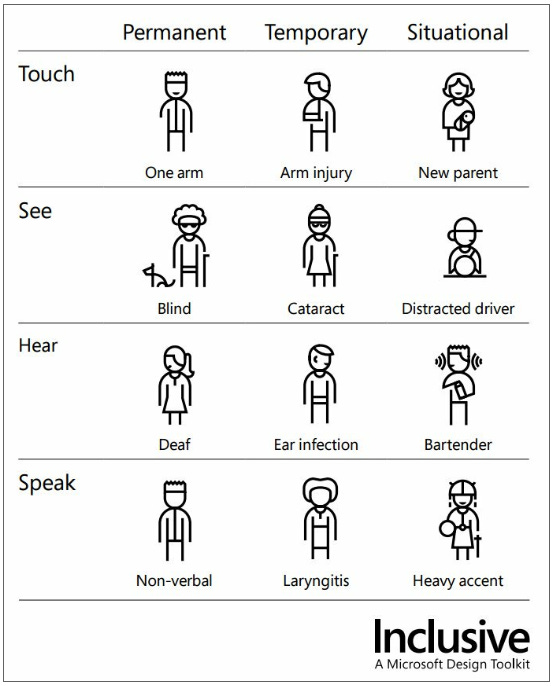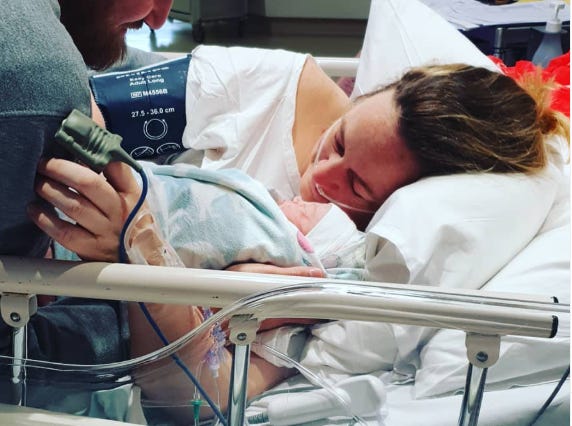Are you disabled? Maybe. Are you discriminating? Probably.
A repost from LinkedIn.
My full time corporate job is talking to people about disability and accessibility. There invariably comes a moment when someone says, "Wait, am I disabled too?" followed by an ‘ah-ha' moment about what discrimination can look and feel like.
We are all either disabled or not-yet disabled, statistically speaking.
Today’s unlearning is the expectation for an individual to disclosure as a precursor to action, often designed into a process. And that sometimes it's a complicated journey to identify as disabled.
Disclosure, identity and business targets.
Since taking on roles leading accessibility and inclusion, I’ve been in town halls and team meetings, raising awareness and socialising (internal) employment targets. Eager to help, the question arises, “What is a disability?”.
Let’s start there. A disability is a physical or mental condition that limits a person's movements, senses, or activities. In Australia, we have the Disability Discrimination Act, and the definition of 'disability’ used in the Act is broad. The Australian Human Rights Commission explains, “It includes physical, intellectual, psychiatric, sensory, neurological and learning disabilities. The Act covers disabilities that people have now, had in the past, may have in the future or which they are believed to have.”
Vague. Broad. Contextual.
Discrimination is the act or feeling of being treated differently. Disability can be subjective to the person. Even then, both discrimination and disability can undulate with circumstance and time. An individual's relationship with disability and feelings of discrimination are theirs.
I’ve come to realise it is essential to know your rights and that the law happens to have the term disability in it.
People don't automatically identify with the word disabled because they fit the categorisation of disabled, just as businesses don't suddenly halt a business practice identified as discriminatory.
Do I support employment targets? Yes. What gets measured matters. It’s a number to facilitate a discussion. Will everyone who is disabled disclose? Unlikely. So don't force disclosure to support disabilities.
My journey
It took me years to use the term disabled about myself and longer to use it publicly and confidently. In those years, I’d had disabled car park permits, walking aids and been on some hard-core pain medication. I believed I'd return to normal if I tried harder. That I wasn't actually disabled.
Internalised ableism occurs when we are so heavily influenced by the stereotypes, misconceptions, and discrimination against people with disabilities, that we start to believe that our disabilities really do make us inferior.
What changed for me was the experience of being pregnant and disabled. Fighting the medical system, while my employer and manager found every possible way to keep me safe and working, galvanised within me a desire to help others. I reflect on how lucky I was with those around me at work. I’d won the leader lottery. Yet, so many others are not so lucky. I returned to work, determined to speak up and speak out, to make visible disability leadership and our rights.
I wrote about my disability advocate origin story in two parts on Substack.
My Disability Advocacy Origin Story - Part One.
I hope this newsletter finds its way into your inbox like an old friend, one you haven't seen in forever, yet the conversation flows as if no time has passed. The last year has been a blur as I started a new job, disability ups and downs, purchasing an accessible house and leaning into supporting those around me - at work and home. As I’ve said before, …
So, are you disabled?
Maybe. Why does it matter if you identify with the word disability or not? The reality is that your rights are covered by laws that use the term. Experience has taught me to focus instead on knowing my rights and evolving my relationship with the terminology.
Hold lightly the word disabled. Hold tightly your rights.
Disclosure is too often for someone else's curiosity, a common expectation before help is provided. Disclosure to access human rights is required much less than you might expect.
And for businesses, the choice by individuals not to disclose is not a get-out-of-jail-free card. It doesn’t abdicate your responsibility not to design discrimination into customer or employee experiences.
Impactful commercial and human outcomes
Scalable, profitable, relevant businesses are efficient in their use of resources. A common misconception is that accessibility is more effort or costly. It's not. Accessibility can facilitate a more efficient, broader use case when considered from the start — a carrot.
The stick. Without accessibility, there is a risk of discrimination.
For business, let's clarify the comprehensive scenarios disability discrimination covers.
Employees, contractors and partners
Customers, consumers and users
The person with the disability and their associates
Products and services, paid or unpaid
Communication from, to and with
Physical environment (eg buildings)
Online environment; ones we build, procure, add content to or expect people to use when interacting or working with/for us
A better question might be, what doesn't it include?
There are, of course, some exclusions, inherent requirements of a job or unjustifiable hardship. The physical nature of a police officer role or the financial constraints of a local football club might be legitimate exclusions. The preference of a manager or financial hardship against billions in revenue is probably not.
Some people may require manual workarounds to accommodate an unexpected need or change use cases. Too many manual workarounds are costly.
And here is my point, if you necessitate disclosure before accessibility, you’re likely creating an inefficient business full of manual workarounds or missed revenue.
Inclusion; it’s how we do things around here.
True inclusion in the workplace makes disclosure a choice rather than a requirement or a critical dependency to avoid discrimination.
Take, for example, the inclusive practice of providing pre-reading. For people with cognitive disabilities, neurodivergent or introverted, having content provided in advance allows time to process and consider the points raised. Pre-reading can level the playing field with extroverted, quick thinkers like myself. It transforms meeting time, ensuring everyone's preparedness for informed decision-making or collaborative discussions.
Disclosure should sparingly necessitate accommodations.
Providing pre-reading could no longer be a practice restricted to meeting settings where someone is ‘out’ or has asked. Neither should colour-plus RAG status updates or disabled toilets with automatic doors.
None of it requires disclosure first unless you designed disclosure into the solution.
Lasting solutions change how we do things around here. They create the conditions to feel included, considered and respected. Then, we can expect to see disclosure increase.loves
Unlearn the assumption of disclosure to be inclusive. Reduce the need for individual disclosure as a precursor to corporate action. Instead, acknowledge the sometimes complicated journey of identifying as disabled and consider how inclusion might be how we do things around here.
Unlearning Prompts
Categorical definition of disability, instead, understand its personal and situational context.
Disclosure as a precursor to designing for needs or changing ways of working.
How to make systemic change for lasting impacts.
Join the unlearning.
My work is geared towards shifting these systems, to take the pressure off people alongside commercial outcomes. You can subscribe to learn with me. I'll share what I learn (and unlearn) about accessibility, inclusion and disability. Together, we will consider the implications for impactful commercial and human outcomes.



